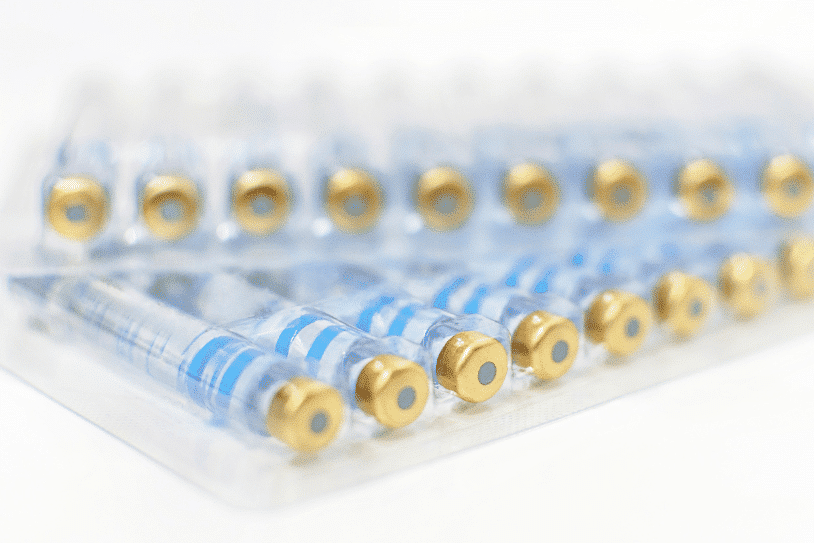
Protect Your Medical Devices: Comprehensive Testing for Maximum Safety and Efficiency
Imagine a medication losing its effectiveness due to faulty packaging. To avoid such situations, packaging testing is essential. The tests offered by Micom Laboratories simulate real-life transport and storage conditions to ensure your product reaches its destination in perfect condition. In other words, we check that your packaging acts like a shield, protecting your product from shocks, heat, cold, and humidity.
Let’s dive deeper into why packaging testing is crucial for medical devices.
Why is it essential to test medical devices?
Medical devices are critical for diagnosing, treating, and preventing diseases. Before being used on patients, they must undergo rigorous testing to ensure they are safe and effective.
In 2024, there was a 14% increase in medical device recalls compared to previous years. Errors related to medical devices cause around 1,000 deaths per year in the United States, which highlights the importance of quality/performance controls.
Risks associated with using medical devices can come from various sources. Storing the medical device for prolonged periods can damage the device itself or its packaging, compromising its safety. The same applies to handling and transport.
That’s where our specialized medical device packaging testing services come into play.
Packaging Testing for Enhanced Compliance and Protection
In the medical device manufacturing industry, packaging tests ensure that the device functions as intended and does not pose unnecessary risks to patients or users.
Rigorous and complex tests, including accelerated aging and transport validation tests, are essential to ensure that the packaging meets regulatory standards and can withstand challenges related to transport, storage, and use. At Micom, we categorize our tests into two main areas:
1. Compliance with Strict Regulatory Standards
Medical device packaging must meet strict regulatory standards to ensure patient safety. Agencies like the FDA and Health Canada require packaging systems to maintain sterility and integrity throughout the product’s lifespan until use. Rigorous testing is necessary to simulate real conditions and achieve this level of compliance.
Key tests:
- ASTM F1980: Accelerated aging tests simulate the long-term effects on sterile barrier systems, ensuring their effectiveness throughout the device’s intended lifespan.
- ASTM F1929: ASTM F1929 testing detects leaks in porous medical packaging to ensure the packaging serves as an effective barrier against contaminants.
2. Product Safety and Maintained Sterility
The primary goal of medical device packaging is to maintain sterility until use. Any breach of packaging can lead to contamination, rendering the device unsafe. Additionally, the packaging must be robust enough to protect the device from physical damage during transport and handling.
Key tests:
- ASTM D4169: Laboratory transport simulation tests are essential for the safe use of products. They recreate mechanical stresses such as drops, tipping, vibrations, impacts, and compressions, and their negative and dangerous effects on equipment performance and safety.
- ASTM F1886: ASTM F1886 is a visual inspection method that evaluates the integrity of seals in flexible packaging, a crucial element in maintaining the sterility of medical devices.
- ASTM D4332: This test conditions packaging materials under various environmental conditions before testing them using storage and transportation simulation scenarios.
- ASTM D6653: ASTM D6653 testing determines the effects of high altitude on packaging, particularly important for devices shipped by air.
A Comprehensive Testing Strategy for Successful Packaging
In a competitive market like medical device manufacturing, packaging can be a key differentiator. High-quality, well-tested, and innovative packaging strengthens brand reputation, inspires trust in healthcare professionals and patients, and improves usage and compliance.
Thus, it’s important to adopt a comprehensive testing strategy that includes robust tests to ensure the packaging not only protects the device but also meets all necessary standards and performance criteria. At Micom Laboratories, we prioritize this holistic approach, covering all aspects of packaging testing, from vibration and UV tests to cold chain and thermal shock tests.
Investing in Packaging Testing for Long-Term Success
The global medical device market is expected to reach $863.2 billion by 2030, with growing demand for advanced technologies and innovative devices. This trend underscores the increasing importance of testing services in this expanding industry. Micom Laboratories’ experts deeply understand the complex requirements of this industry, which is why we offer a wide range of testing services tailored to these needs. By ensuring that your packaging meets the highest standards, you protect both your devices and your brand, remaining competitive in a growing market.
Curious to see how our solutions have made a difference for other companies? Dive into our medical device packaging case study to discover how we secured and optimized their medical devices.
Contact us today to discuss your medical device testing needs. Together, let’s ensure the safety and efficiency of your products while navigating a dynamic and ever-evolving market.


